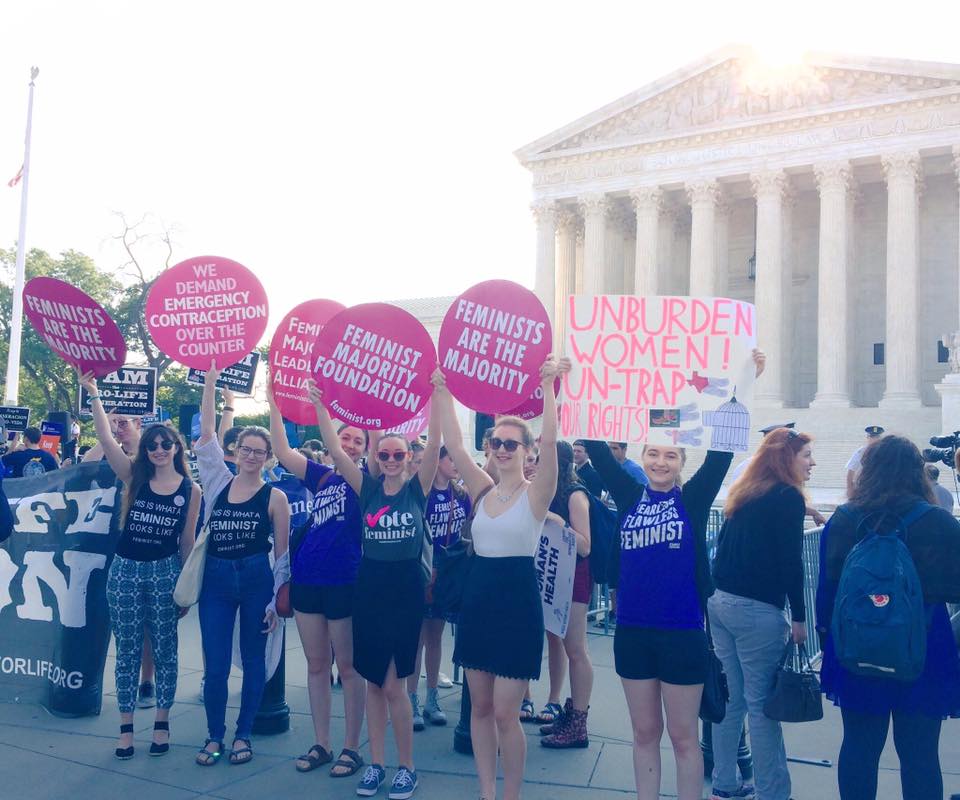Two days ago, the highest court in the land affirmed that a woman deserves compassion, respect, and dignity in making her own health decisions without needless barriers. In a decisive 5-3 vote on Whole Woman’s Health v. Hellerstedt, the Supreme Court finally declared that the two Texas laws passed in the name of “women’s health” have imposed stringent and excessive requirements on doctors and health care facilities are undue burdens that restrict women’s constitutional right to access legal abortion. Prior to these sham laws, over 40 facilities in Texas were up and running. After legislators passed the laws, only 19 abortion clinics survived, and if the Supreme Court upheld HB-2, only 9 or 10 would serve Texas, a state with 5.4 million women of reproductive age. By calling out this medically unnecessary red tape for what it is, an undue burden, the Supreme Court has made it clear that this country won’t tolerate calculated attempts to inhibit women from choosing what is best for herself in terms of her pregnancy.

After SCOTUS ties on liberal causes like Immigration and Public Unions, this victory was more than a pleasant surprise for women’s rights advocates. However, we cannot celebrate this decision without considering some negative implications. First, the “undue burden” standard is itself a sexist burden of proof for any woman, clinic, or abortion provider to meet. An undue burden is still subjective and up for debate—now what can conservative lawmakers get away with when attempting to classify due burdens? Currently, 27 states have laws on the books mandating a wait period after pre-abortion counseling. In states like Missouri, North Carolina, Oklahoma, South Dakota, and Utah, a 72- hour waiting period prevents women from immediate access to abortion. Isn’t this an undue burden?

Next, while Justice Ginsburg stated “When a State severely limits access to safe and legal procedures, women in desperate circumstances may resort to unlicensed rogue practitioners, faute de mieux, at great risk to their health and safety,” this decision doesn’t eliminate sham laws across the country, it only sets a precedent and warns states that it would not be tolerated if brought to the courts.
Finally, it will take a herculean effort to reopen all the Texas clinics women need to have easy access to reproductive health care. Since 2013, many clinics have closed, lost their lease, fired their staff, and have dissolved entirely. Rebuilding over 20 clinics will not be an easy feat, and it will likely take another couple years to get back to pre-HB2 Texas. And it should be noted that this is still after the three years many women waited without easy clinic access. While Wendy Davis fought for these women in a historic 11-hour filibuster, SCOTUS took its time taking up the case. All women deserve the right to control their lives and end their pregnancies if they so choose, and this ruling is in need of further grassroots and legislative support.
Despite its shortcomings and much needed improvements, this decision is monumental for my generation. Millennials, born between roughly 1982 and 2004 have only lived in a post Roe v. Wade world, and many aren’t even aware that abortion was illegal in most states before 1973. Many millennial women are now coming of age, and many others are at the cusp of or just entering motherhood. The median marriage age is now 30 years old, when it was just 23 in the 1970s. These notable demographic shifts in the trajectory of millennial lives shows that women today have more agency in their lifepath than ever, and are able to pursue their professional ambitions without worrying about potential career derailing due to unwanted pregnancies. This Supreme Court decision shows women that the government will support their 14th amendment right to personal liberty, and I think millennial women are happy that their government believes they should have complete control over their life and choices.



What a fabulous article. Keep ’em coming